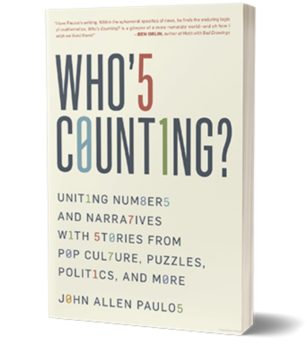Dilip D’Souza in Shaastra:
 Yet, exactly why is Paulos comparing humour and mathematics? He’s doing what I suspect has become a lifelong pursuit: showing just how ubiquitous mathematics is and how much we lose by being deaf to that truth. He’s doing so by relating mathematics to so much that makes us human. So, there’s humour, of course — is there anything quite as human? But also lies and logic and religion, also politics and puzzles and probability. If you’re hard-pressed to see the connections, do read the book: that’s why Paulos wrote it, precisely to show that the connections exist; that by recognising and acting on them, we may become better citizens – by understanding the facts and figures that swirl about us, and being better informed about public policy decisions.
Yet, exactly why is Paulos comparing humour and mathematics? He’s doing what I suspect has become a lifelong pursuit: showing just how ubiquitous mathematics is and how much we lose by being deaf to that truth. He’s doing so by relating mathematics to so much that makes us human. So, there’s humour, of course — is there anything quite as human? But also lies and logic and religion, also politics and puzzles and probability. If you’re hard-pressed to see the connections, do read the book: that’s why Paulos wrote it, precisely to show that the connections exist; that by recognising and acting on them, we may become better citizens – by understanding the facts and figures that swirl about us, and being better informed about public policy decisions.
Does that sound high-minded? Perish the thought! High-minded this book is not, and I mean that as a compliment. Admittedly, some sections need a little more thought than others, perhaps occasionally a serving of mathematical dexterity. But open your mind to those, too, and this book brings plenty of rewards.
More here.
